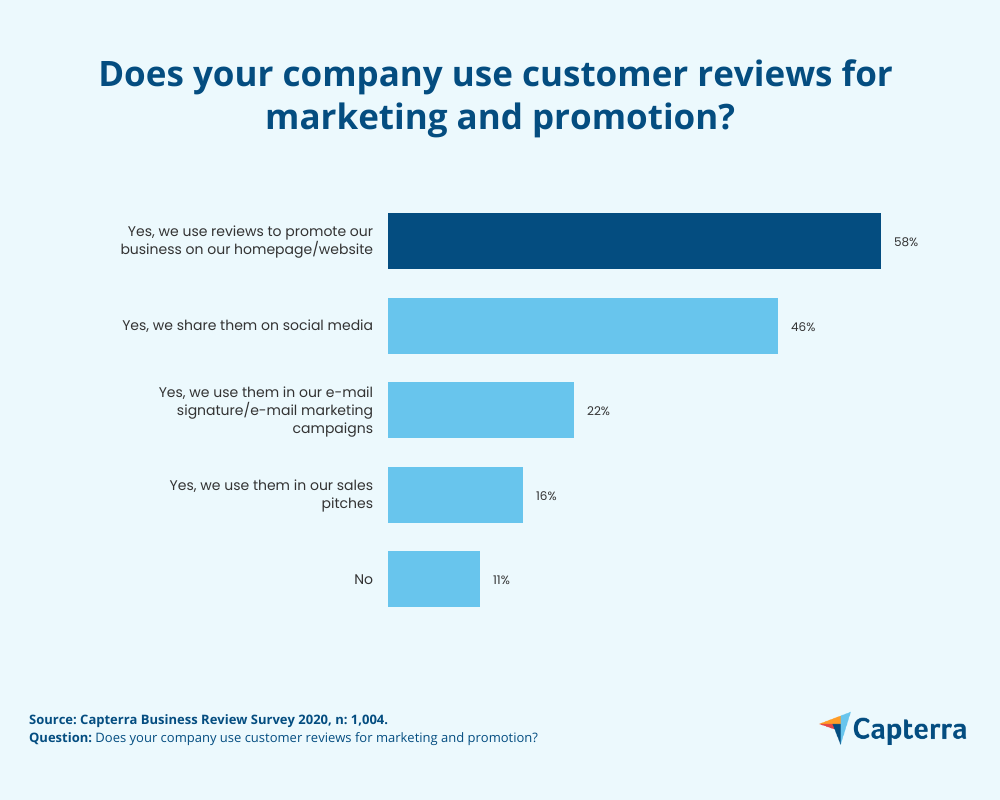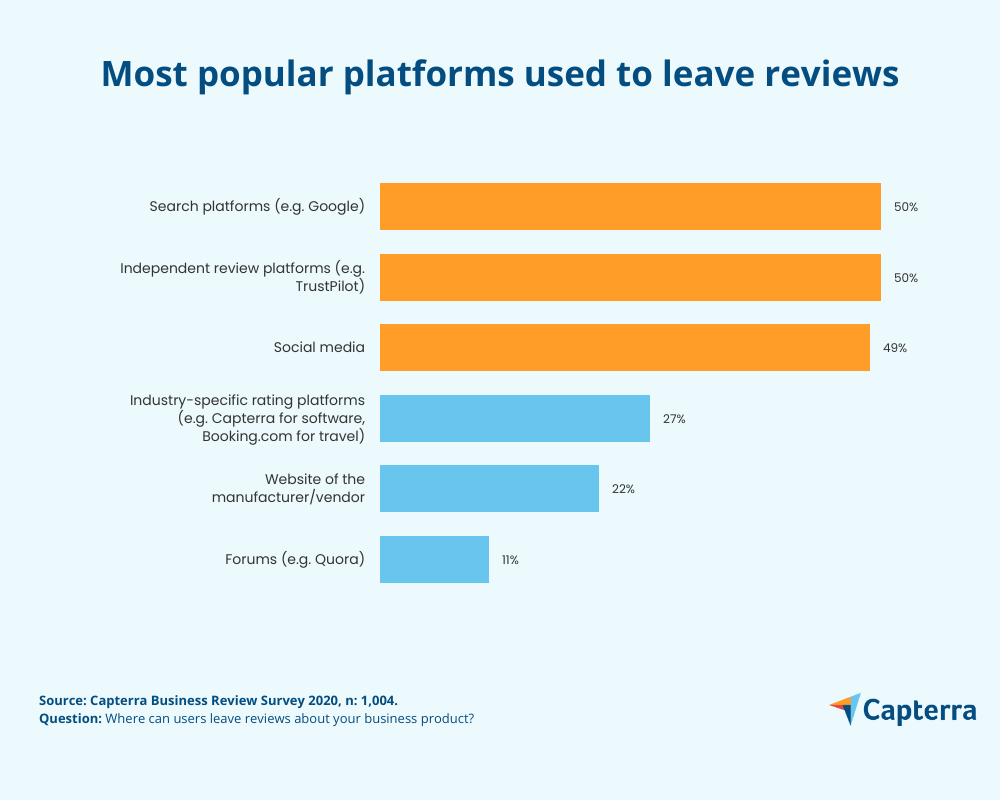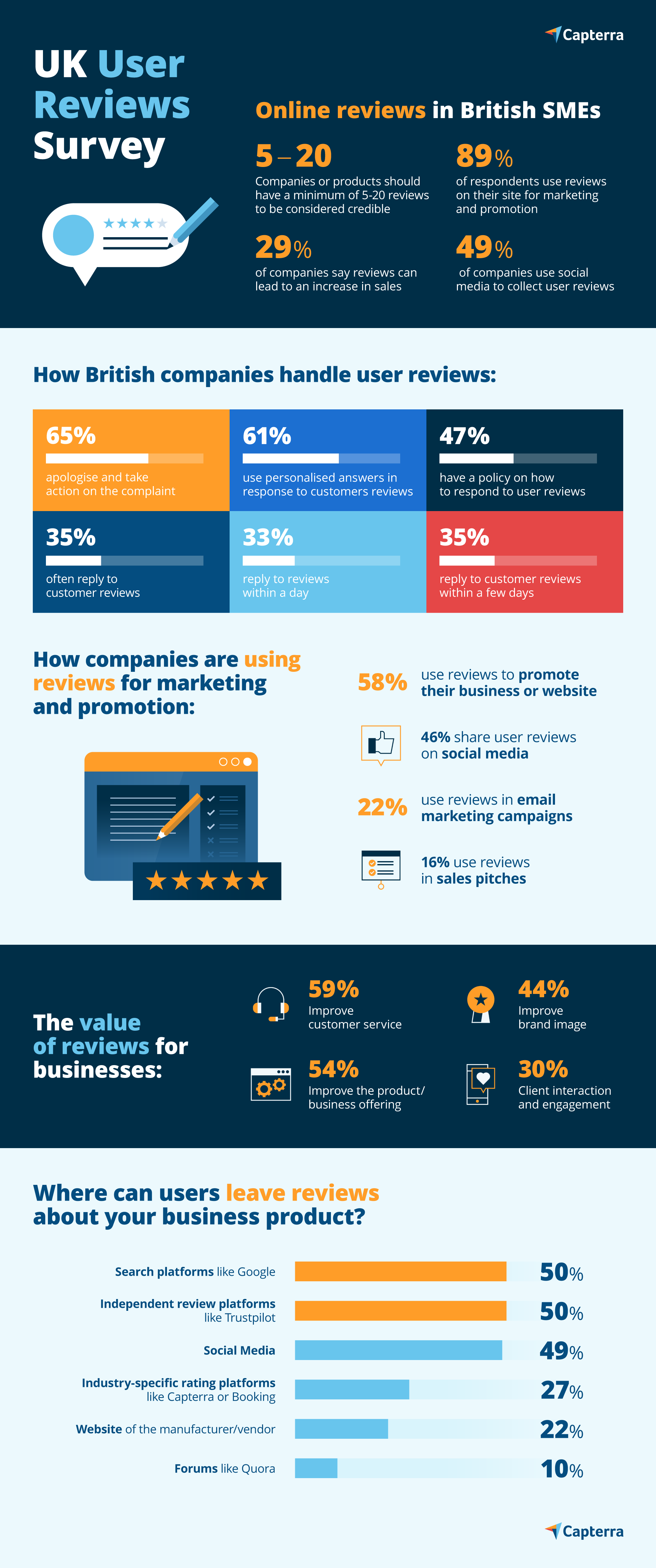Customer reviews can be the best marketing tool for a company. It is essentially the modern word of mouth. 53% of British consumers always read online reviews about a product/service before buying a product, and 40% often before making a decision.

Having a good reviews management strategy is vital for companies to build trust and increase conversations with customers. Using specific review management softwarereputation management software, , or manual methods to track and assess these can have a significant impact on a company.
We asked 1,004 SME owners, managers and mid-managers in British SMEs to understand how companies use reviews and what impact the number of reviews makes on their business(scroll to the bottom of the article for a full methodology).
Companies with more reviews focus on marketing and customer service
The survey shows that British SME owners see customer reviews as a positive asset for their company, and are dedicating time and resources to reviews. 89% of respondents use reviews on their site for marketing and promotion, using these on their homepage and website. 46% of business owners share reviews on social media and 22% use them in their email signature and email marketing campaigns.

Companies of all sizes dedicate resources to track and maintain reviews. 81% of companies with 11-50 employees and 87% of those with over 51 employees have a dedicated person or a team taking care or reviews.
SMEs use reviews to help with marketing and promotion, but this can change depending on the size of the company. For example, 39% of companies with over 51 employees state using reviews for marketing and promotion, and 26% of them also state that reviews help improve the product and business offering, as well as interaction with customers.
Improving customer service (29%) is the main value of reviews for the majority of businesses business. In addition, 29% of companies said that customer reviews also help them increase revenue and profit. Smaller businesses benefit more from this, with 16% of sole traders and 14% of businesses with 2-10 employees stating that reviews lead to more sales.
Google, TrustPilot and Social Media are the most popular platforms for users to leave reviews
46% of companies surveyed ask customers to leave a review after a call or a chat conversation, while another 46% asks for feedback after they have purchased a product or service. 27% of them insert a link on their website that directs customers to an external reviews page (such as Google or TrustPilot). When asked what platforms companies provide users to leave feedback, Google (50%), independent review platforms such as TrustPilot (50%), and social media (49%) are the three most popular ones.

Personalised replies and prompt response: key traits to British SME reviews process
Companies are using different techniques to track and respond to customer reviews. Below is a snapshot of how are British SME owners responding to customer reviews:
- Sooner rather than later: When looking at how often companies reply to customer reviews, 35% reply often and 27% state that they always reply. Speed of response is very important, as a negative review can be detrimental for the business.
- Personalised responses: 61% of decision/makers in British SMEs use personalised answers to reviews
- Better with a policy in place: Almost half of the respondents (47%) have a policy on how to answer (referring to the content, tone and style of the answer)
- Apologising and acting on it: The majority of owners in the British SMEs surveyed (65%) apologise and act on the complaint, forwarding it to the relevant team to be acted upon as soon as possible.
Larger businesses have more reviews and see a return on investment in reviews
The survey also shows that companies that have more employees also have a larger number of reviews. Dedicating resources to manage reviews is also seen as important for SMEs that have more employees.
87% of these companies have a dedicated person or team to deal with reviews. The survey shows how these companies also use reviews for marketing, with 39% stating they use reviews for business promotion.
The use of specific software becomes more widespread as the size of the company increases. For example, a third of companies (32%) with over 50 employees use review management software or reputation management software to help them manage reviews.
39% of sole traders use spreadsheets to keep track of reviews
The results of our survey showed that sole traders (a company with one employee) are the ones struggling the most to collect reviews. 23% of respondents who are sole traders or self-employed have 1-5 reviews.
When asked how they collect reviews, 26% ask a customer to leave a review after a call and 23% send a review request after purchase. The platforms most used by them to ask customers to leave reviews are social media sites (32%) and search platforms like Google (23%).
73% of decision/makers in a sole trader company consider reviews worth the investment in time and money. They see the value in reviews: 26% say that reviews help improve their business and 24% say that it improves the relationship with customers.

* Survey methodology
Data for the “Capterra Business Reviews Survey” study was collected in October 2020 from an online survey of 2,062 respondents that live in the UK.
The survey data used for this article comes from 1,004 participants who qualified to answer. The information in this article corresponds to the average of all surveyed participants.
Note: There were several answer options available for the graphics so that the total of the percentages exceeds 100%.
The criteria for participants to be selected are:
- Owner/CEO
- High management/working across-departments
- Middle management
And with the following number of employees:
- 1 employee
- 2-10 employees
- 11-50 employees
- 51-250 employees
All participants come from different industry sectors.
